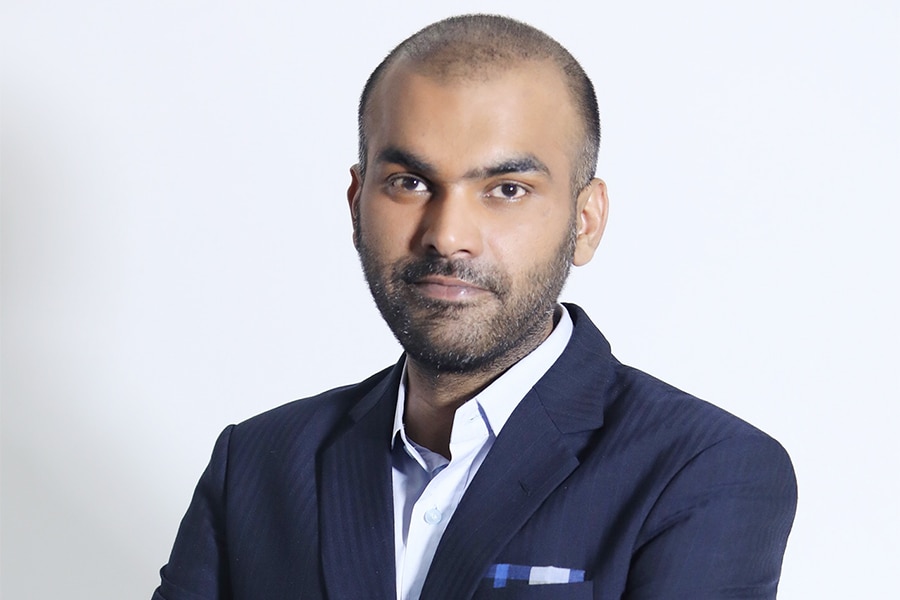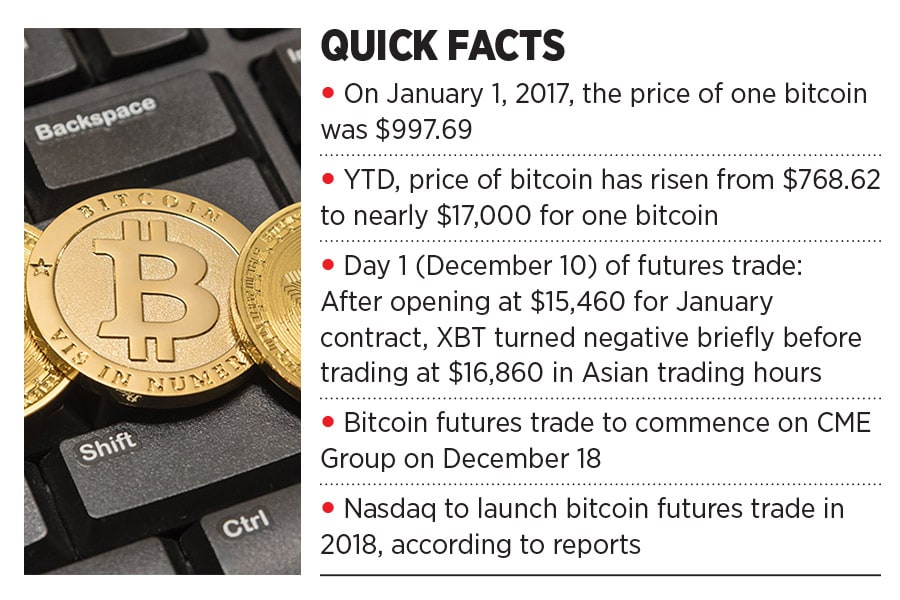
Bitcoin price to settle at $10,000-$11,000 over next fortnight: SearchTrade CEO Vishal Gupta
SearchTrade founder and CEO takes us through the reason behind the bitcoin price rise, what it means and the advice he would give early adopters of the cryptocurrency
 Vishal Gupta, founder & CEO, SearchTrade
Vishal Gupta, founder & CEO, SearchTrade Virtual currency bitcoin’s prices have been in a frenzy since November end, when the value of one bitcoin (BTC) was surging by at least a few hundred dollars every trading session, crossing an all-time high of $19,000 on December 8 briefly [on bitcoin exchange Coinbase], before settling for lower.
In the one month period from November 1 to December 1, the price of bitcoin surged from $6,750.17 to $10,859.56 apiece, up by 60.9 percent, according to virtual currency news website CoinDesk. On Monday morning [December 10], bitcoin futures contract - XBTc1 - listed on the Chicago Board Options Exchange (CBOE) – led to the website to crash due to unprecedented traffic thanks to cryptocurrency enthusiasts.
Forbes India spoke to Vishal Gupta, founder and CEO, SearchTrade, to understand the price rise, what it means, and what advice he would give to early bitcoin adopters. Edited excerpts:
Q With the incessant price surge in bitcoins, as an early investor in the virtual currency, how do you look at it?
It makes me happy and scared. I don't think this market is sustainable in the short term. Bitcoin mining has become extremely profitable at current levels which means there is going to be a lot of capital moving in that direction, which could negate the profitability. The only way this price can sustain is if mining expands but there’s a production limit on the number of miners that can be produced every month by companies. Once you hit the cap, the profitability remains high and it incentivises the miners to sell, which will bring the price crashing down. Also, bitcoin future contracts are on their way to getting listed on the Chicago Mercantile Exchange (CME) and CBOE Global Markets Inc [on December 10] which will see a lot of short selling of the BTC futures, and the price might come down to $10,000 or $11,000 levels. That's my prediction for the next 15 days.
Q Is there no mechanism to short-sell bitcoins currently?
The mechanism was there but the scale was very small. When they get listed on the Chicago commodity exchange, the capital flowing in is going to be humongous. We will then be dealing with the big boys and not amateurs. It means the retail investors in the US will also be able to participate. So, while the long term trajectory is upward, in the short term, you might see a correction in prices by about 15 to 20 percent.
Q The rally in bitcoin prices has been going on for quite some time now. What caused it?
The rally seems to be a preparation for the commodity listing. Right now, there are bitcoins worth 250 million dollars and we are looking at 4 billion dollars’ worth of bitcoins being traded. That’s serious amount of money flowing into the market every day.
Q Professor Jayant R Verma has said that bitcoins are a bet against governments. Do you agree?
Bitcoins are a bet against governments all over the world. It is an anti-establishment hedge because it's not country specific, so it works as a hedge against the world economy today. Since ages past, gold has been a hedge against inflation and currency crisis, but physically transferring gold to anywhere in the world is not possible. Bitcoins work on the internet and are essentially transfer of data at the end of the day, which can happen seamlessly to any part of the world. So in terms of practicality, bitcoin is way better than gold.
Q Does the increasing popularity of bitcoins indicate that a lot of people are unhappy with the government(s)?
That's a very theoretical analogy and not a practical one. In reality, people want the opportunity to make money, since the price is increasing. Bitcoin succeeds on a network effect. Today there are a million machines on the network that have been paid for, and there’s a recurring cost that people are happy to incur. Is the motivation to bet against the government or just to make money? That is debatable.

Q With the price rise, are bitcoins becoming an unviable option for retail investors?
No, people don’t need to buy one complete bitcoin. They have the option to buy only parts. For example, keen investors can buy only 0.2 BTC. You don't need a million dollars to participate; even Rs 50,000 would be enough to start buying. The focus may be only on bitcoins right now, as an entire market of alternative [virtual or cryptic] coins of about 1,600 to 1,800 currencies has been created. Out of those, only about 20-30 are viable.
Q The Reserve Bank of India is still on the fence about bitcoins and has advised caution...
The RBI does not need to provide direction. Bitcoin would only come under the purview of the central bank and it would have business looking into it if it were recognised as a currency. So far, they have called it a physical asset. The apex bank also asked investors to be cautious before investing which is a loosely worded statement that only serves to clarify RBI’s stand - that it’s not treating bitcoins as a currency. Then it becomes a commodity and its rules apply. So whether you're trading in gold, silver or bitcoin, the legality remains the same. To sum it up, if the RBI declares something not to be a currency, it does not become illegal. Currently, it’s not illegal to buy or trade bitcoins.
Q Do you consider it a commodity or a currency?
Right now, it is a commodity. If something appreciates this dramatically in value, there is incentive in hoarding it and not spending it. Traditionally for fiat money, there is an incentive to invest, because it depreciates in value by lying around. For bitcoins, right now, it’s the other way around. In a way, it is mimicking the value of gold. Once bitcoin touches the $100,000 or $150,000 cap, there will be saturation and the volatility you see today will reduce dramatically.
At $100,000 dollar value with 2 million bitcoins mined, it will become a $2 trillion ecosystem which is equivalent to the size of the Indian economy. At that point, by default there will be a slowdown. Right now, the market is still expanding and people are still getting used to it. In the first decade of any commodity, there's a price discovery mechanism at work. Once more people adapt it and you reach a critical mass, the volatility automatically goes down.
Q For how long do you see the volatility going on?
The volatility has already reduced. Back in the day, bitcoin prices used to fluctuate about 80-90 percent in a day, now it’s come down to 15-20 percent a day. At this point, $15,000 apiece sounds like a great number but when bitcoin went from $200 to $5,000, it was a much bigger jump in sheer percentage terms. The jump to $15000 is 3x not 10x. The price rise is coming down gradually and you will see that pattern playing out going ahead. Over the next four years, the volatility will automatically reduce.
Q Since the value is fluctuating so much, does it make sense to transact currently?
It all depends on what the investment objectives are. If you really need the money, you will sell no matter what. With the volatility, the transactions have gone up and the blockchains are clogged. Every block right now is more than 1 mb which signifies that every block is completely occupied.
Right now, bitcoin trading is cheaper than owning real estate and selling them at a good price point. The cost of a bitcoin transaction is negligible. If it's an investment and an asset you are willing to hold, it's way cheaper than real estate.
Q What advice would you give people looking at buying bitcoins at this level?
If you have a three-four year horizon in mind, then bitcoin is a good buy because we are looking at bitcoins at $100,000 or $150,000 over the next two-three years. If you're looking to make instant money on the hype, it's probably a very bad idea. My advice to anyone who wants to invest is that cryptocurrency shouldn't exceed 10 percent of your portfolio. At the end of the day, it's a risky investment and you can't say it's absolutely safe. It can go either way. If your risk appetite is 5 percent of your portfolio, do not exceed 5 percent or if it’s 10 percent of your portfolio, don't exceed that.




